There was a survey by Fender, and the results show that 90% of guitar players quit in their first year of learning because of not having any improvement. One of the main reasons for that is a lack of an important thing in a guitar-playing improvement path – practice. In order to have its purpose, the practice should have its proper flow and an adequate length.
So, How much should you practice guitar? I recommend you should practice each day for at least 15 minutes. But the practice session length depends on your goals and skill level.
Therefore, you have to find a perfect daily routine for yourself, and you’ll see the difference and all of the benefits of a consistent playing habit. Being efficient will not only make you a better guitarist, but it will also free up some time so you can have time for your other daily things to do.
Tips that lead you to the right path are listed below, so by incorporating them, you’ll be on a higher level, for sure.
Playing VS Practicing – What Is The Difference?
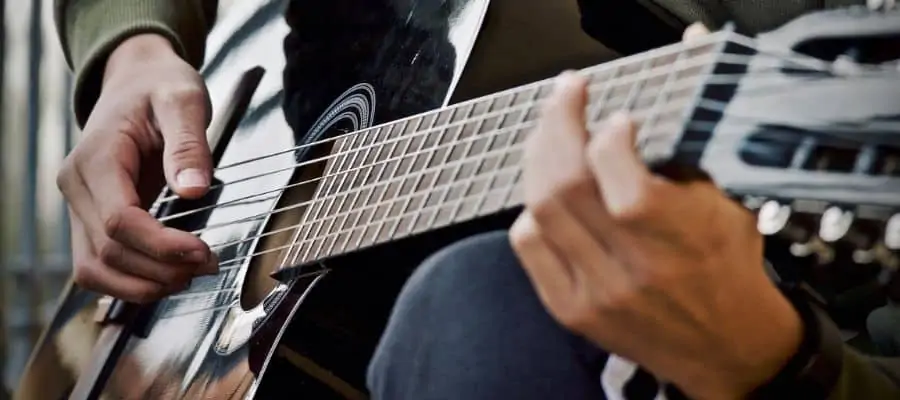
Playing and practicing are different mindsets, and both are important for guitarists’ improvement. We can know which one to choose at a particular moment only if we know the difference between one and another.
Practicing
Practicing is when you try to solve problems; you are trying to find your weaknesses and to fix them, either caused by a technique and interpretation or your music envision. You practice building skills and push your boundaries.
You need a lot of concentration while practicing; you focus on a particular thing and try to memorize it (for example, arpeggios and scales), you analyze your mistakes during exercise, and you’re trying to fix it.
Guitarists need to be really attentive while practicing; even practicing is walking at the edge of our abilities because that’s the proper way to perfect playing.
Playing
Playing is when you enjoy your hard work during practice time, so it’s a manifestation of practicing.
While playing, you let your inspiration go free, and you just create the music. Playing remains a comfort zone, and improvement is defined as going out of that zone. So, while playing, you won’t improve that much; you just create or test out. Also, repeating one exercise or a part of the song that became easy to play and has become successfully learned is not a practice – it’s playing.
Which Mindset Is More Important?
Both playing and practicing are important for the optimal growth of the musician because that’s how you train both hands and minds. We need practice for perfect playing, and you can’t divide these two. And if you spend more time on one mindset, you will develop an imbalance that is not that good for your improvement.
Too much practicing will vanish your creativity, and your playing won’t have that beautiful melody, while too much playing will become boring, and everything will sound similar.
How Many Days A Week Should I Practice Guitar?
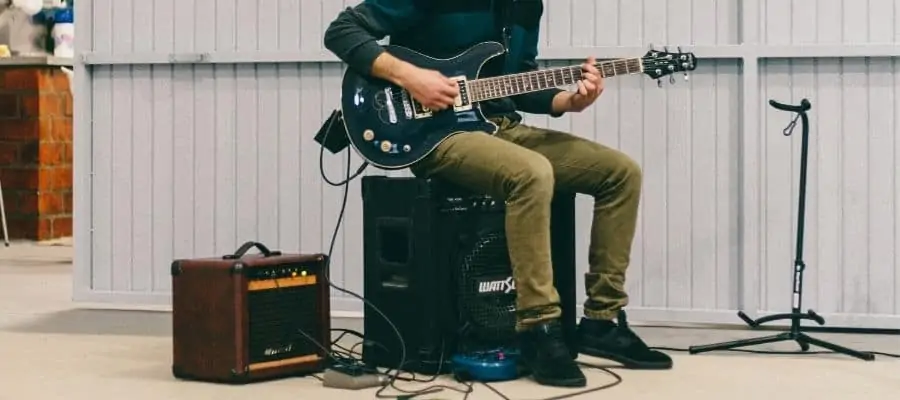
Science says that you forget most of what you learned yesterday if you don’t practice. It is called a “Forgetting Curve.” So, if your habit is to practice every two or three days, you are going to spend your time re-learning, and your improvement will be slowed down.
So, that’s why a guitarist should practice every day. But, some experts say that music players have to establish a 24-hour period of time every week where they’re not allowed to pick up the instrument to let the brain process what has been learned. So, one- day break is enough, especially in the middle of the week.
Everyone has more and less busy days in life. So, when there seems to be no time for practice sessions, even a few minutes of practicing will help you to improve and will keep your fingers’ calluses from getting soft. Sometimes it’s unavoidable you’ll miss a day, but try to stick to your everyday practicing habit as much as you can.
How Many Hours A Day Should I Practice?

How many hours you should practice a day depends on your goals. So, the first step is to identify them.
If playing guitar is your hobby, then 20-30 minutes of practice is enough for you. On the other side, if you want to be on a bit higher level, and maybe if you need one hour of practice per day. If you want to play in a professional sense or be in a band, then one to two hours a day is enough. Do you want to master the guitar? Then, play three to four hours a day, and you’ll see the improvement for sure!
Of course, life circumstances fluctuate every day, so these time frames can vary. You are the creator, and over time, you’ll know how many hours of practicing shows the improvement.
How To Practice Guitar Effectively?

As I said, only effective practice makes the difference and has a lot of benefits. So, if you want to practice, then let it be adequate and a ticket for success. Therefore, there are some things that you need to follow.
An Atmosphere
Create the atmosphere you prefer to concentrate in. Be somewhere without distractions. Make sure you have everything you need; a pencil, paper, glass of water, tuner, etc.
Tune Your Guitar
It’s really important for you not to be out of tune while practicing because while practicing, you are making some kind of a connection between your senses; your ears, fingers, eyes… It is like creating such a bad habit. So tune your guitar and let your ears adjust to the right sound!
A Warm-Up
A warm-up is so important, better said, essential. Prepare your mind and your body for practice. It’s important to get the blood flowing before you start something out of your comfort zone. Shake your hands and massage them.
Warm-up lasts for at least 5 minutes. For example, you can do alternate picking (alternating between up-and downstrokes), and you can go for scales (minor pentatonic scale and major scale) for three minutes – on a different fret every day. Consider the keys of the pieces you are going to practice. Then, as a break, start playing something simple.
Using The Metronome
A metronome is going to improve your timing (it enhances your sense of where the beat is), it helps you to build speed, and it helps you to slow down.
Determine Your Goals
Have a goal for each practice session. Break it into smaller ones. You will feel motivated with every goal accomplished. Your goals need to be determined based on your drawbacks in playing. So, let your goal be something that you don’t know, and you find really challenging to learn.
It’s good to have both big and small goals when it comes to practicing. Big goals are actually the reason why you choose to play the guitar, and small ones are going to keep you motivated and keep you closer to achieving big ones.
Have A Journal
Write down your goals for every day, your accomplished goals, your mistakes, and things that didn’t go well, so you can go back to them in the next session. Also, make an everyday schedule; try to find a specific time to practice, which is the best way to make sure you won’t forget a practice session.
A Consistency
As an old one says, consistency is the key. You are going to practice guitar effectively if you have regular sessions, at least 6 times a week.
Go Out Of The Comfort Zone
Playing something that you know perfectly won’t make an improvement, and the improvement is the main practice aim. So, practice what you don’t know and what’s hard for you. As I said, break your goal into smaller ones, and you’ll see how easy everything is.
Do Breaks and Reward Yourself
While playing, do breaks to let the brain process things. That’s how your practice sessions can be more effective.
And if you accomplish something hard and challenging, you absolutely deserve an award!
Can I Practice Guitar Too Much?
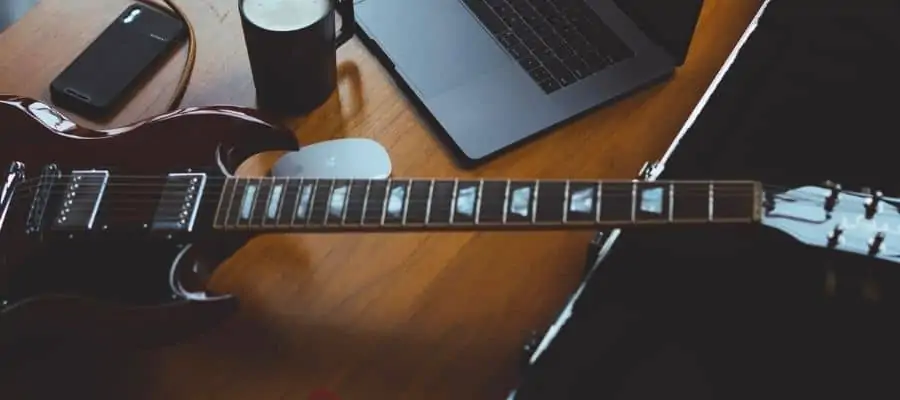
Yes, you can practice too much. Some experts say that longer practice sessions can cause more damage than benefits. There are a couple of things you need to understand in order to know about determining practice session lengths in the future.
Quality Over Quantity
Correctly and mindfully practicing is way more important than mindless hours practicing. If you focus on the thing you have to learn; you are doing well.
But, if you practice and at the same time watch a sitcom, plenty of hours of that practice type can’t replace 30-minute practice sessions with a deep focus. Mindlessly strumming is exactly the same as sitting in the gym and taking selfies for Instagram.
An Imperfect Brain
Memory is the key. But, our brain isn’t perfect, and it does not memorize all the things. At the beginning of the practice session, the brain memorizes everything. As the session continues, memorizing is not that strong, and in the end, the brain again memorizes more and more as you finish.
So, the closer the beginning and the end spots are, the better. Keep in mind that a 5-hour session has just 30 minutes of strong memorizing.
How Long Should My Practice Sessions Be?
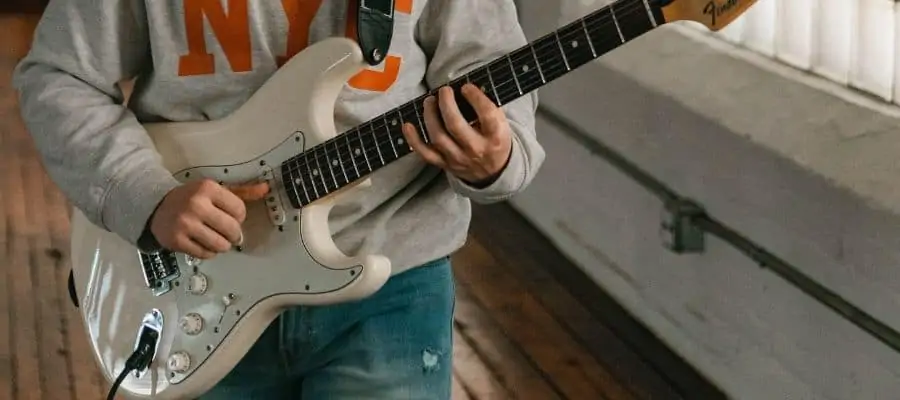
It’s simple; practice sessions need to be limited to a duration that allows you to stay focused. So, it’s some kind of an individual thing. Without focus, your session will be just a waste of time.
As I said before, our brain is not catching up with the information all the time, so shorter sessions are the best possible choice.
How Good Can I Get At Guitar In 3 Months?
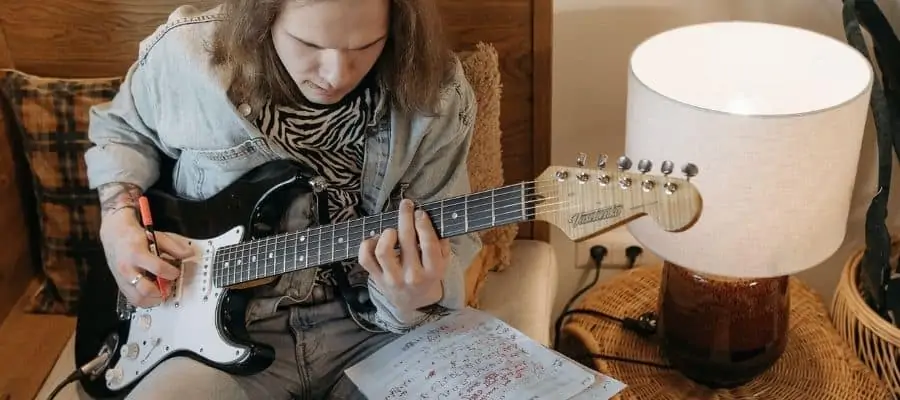
You can’t expect to become the master in three months, but you’ll be amazed how far you’ve gone in that short period of time.
What Can I Learn In 3 Months?
You can expect to learn basic things in three months. Practice consistently, and you are going to learn some of the bar chords, all open chords, several songs, standard Pentatonic scales, basics of guitar posture and fingerpicking, and so on.
But, this is a subjective thing. It depends on what your focus is. If you are more like playing songs, you’re going to practice chords, but you may not gain that much knowledge when it comes to several techniques.
A focus is so important, so more focused players can gain more knowledge in a particular period than ones whose focus is not that present while practicing.
What Can’t I Learn In 3 Months?
You’ll pick up the basics of playing, and you’ll be able to play songs while sitting around the fire with your friends. But, for some skills to be gained, it takes more than three months of practice.
Clean notes, knowing the entire fretboard, and non-buzzing barre chords, for example, need more practice than three months.
But, if you play the guitar for this period of time, you’re on the way to becoming a master one day. Everything is better than zero.
How Long Does It Take To Master On Guitar?
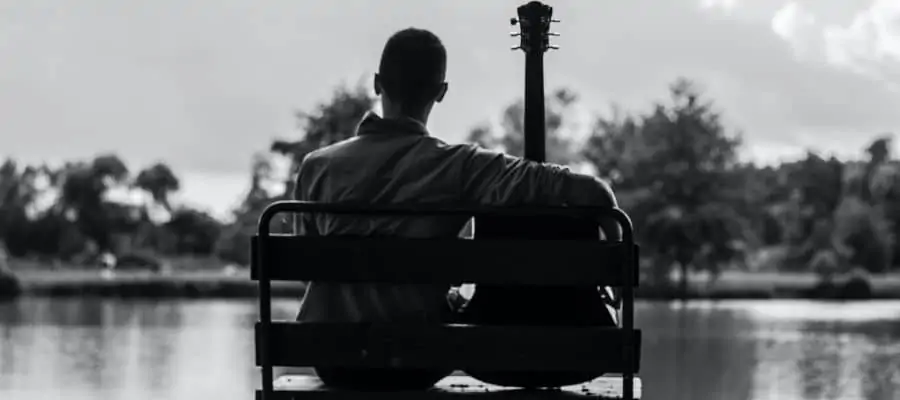
Practice is going to make you a master of guitar in several years. Keep in mind that the best guitarists were at your place once.
The “10,000” Hour Rule
“It takes 10,000 hours of practice to become an expert” is made by Malcolm Gladwell. There are many discussions about whether it’s a myth or not because some guitarists could get the results before hitting this numerical milestone.
But, the good thing about this rule is that it shows the importance of practicing. Also, it teaches us that talent means nothing if there is no practice and that mastering guitar is such a long journey; it takes about 10-15 years if you practice every day for 4 hours a day, for example.
How Should A Beginner Practice Guitar?

First of all, both beginners and other skill level players should do some steps to make their practicing more effective, such as the atmosphere without distractions, metronome, tuning the guitar, practice material, journal, and so on. Although it’s important for any player, beginners should have the proper beginning to gain good habits and to follow them over time for better improvement.
It’s really hard to erase bad habits when it comes to practicing. For example, practicing with an out-of-tune guitar won’t adjust a beginner’s ears to the right sound, and that is so hard to eradicate.
A beginner should practice a minimum of 15 minutes up to an hour per day. It increases from 15 minutes to an hour by the time; when fingers become less soft and when a person learns how to keep the focus on practicing.
Is One Hour Of Guitar Practice Enough?
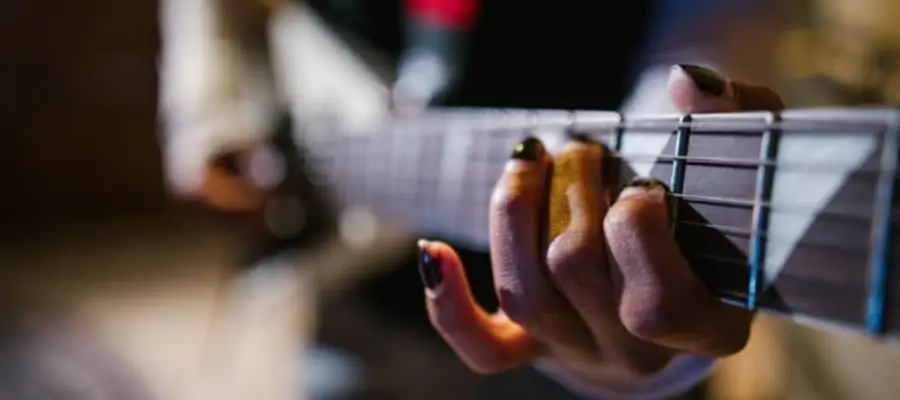
Guitar players do not have the same goals. Someone plays the guitar as a hobby; someone wants to be in a band, while others want to be masters. So, if one hour of guitar practice is enough depends on the guitarist’s goals.
When One Hour a Day Of Practicing Guitar Is Enough?
For a person who hasn’t got aspirations to be a professional guitarist or a master, practicing one hour a day is enough for improvement. An hour of practicing with a deep focus is better than just jamming out for 4 hours and watching on your wristwatch every minute.
If you practice an hour a day, you would definitely be able to play nicely. But, if you continue this habit, you are on the right path to becoming a pro in some years.
When One Hour a Day Of Practicing Guitar Isn’t Enough?
If you are a professional musician, or if you have goals to become one, one hour a day of practicing guitar isn’t enough. An hour a day is not sufficient for mastering techniques and memorizing many different songs.
Also, neither one nor even eight hours of practice a day are not sufficient if it’s not effective.
What Should Be My Guitar Practice Routine?
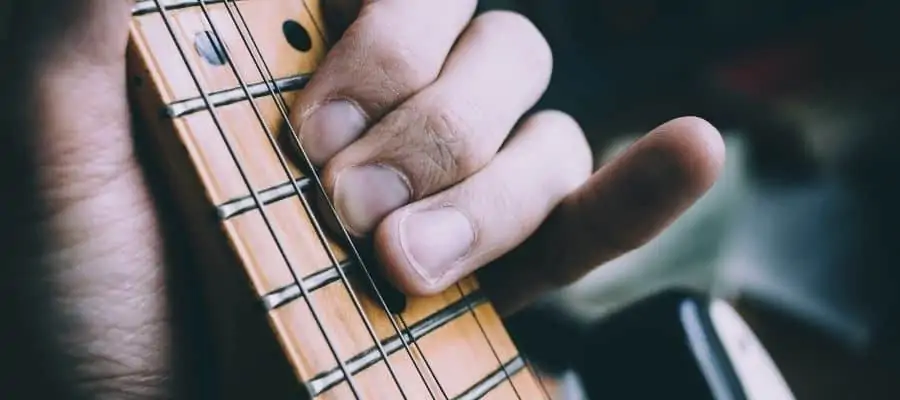
The only thing that will make you improve is the high-quality practice routine that is going to have a focus on the skills the guitarist needs to learn. A practice routine depends on which level of playing you are.
A Beginner Practice Routine
This kind of practice routine needs to cover fundamental things, such as playing open chords, some of the barre chords, playing without having a look at your hand, coordination between picking and fretting hands, and so on. Beginners should practice for 15 minutes a day and then increase up to an hour of overtime.
After a warm-up, a beginner should have a 5-minute basic finger exercise and then 5 minutes of memorizing and playing open chords. Then, it’s important to do more finger exercises, and after that, 5 minutes of basic riffs practice.
Before playing songs, you need to know how to play chords and read their diagrams. The most important basic (open) chords are C, A, G, D, E, Em, Dm, Am. It takes time to play them clearly, but you’ll get there over time. With these several chords, you’ll be able to play many songs. Also, start practicing easy strumming patterns, first in 4/4 time, then you can try playing in 2/4 and 6/8 time. The rhythm is an essential part of becoming a great guitarist.
After learning these two, you can learn how to play some songs. Something a bit challenging for beginners is actually the coordination between chords and strumming.
Learn more chords, such as barre chords, and also learn to read Tabs. Add some fingerpicking tunes to songs, and learn basic riffs, such as the one in “Smoke on the Water” by Deep Purple, for example.
Once you learn some basic solos, it’s time to move on; improve your technique, dexterity, and hand strength. Start practice sessions with a warm-up. Learn to transcribe songs, and train your senses. It is one of the most valuable things you can own as a guitarist.
In your improvement path, at one point, you should be able to improvise using scales. Improvisation is creating a melody using notes from a particular scale.
Don’t forget about music theory. Once you know it, things go faster. Learn it every day, in small parts.
Intermediates Practice Routine
The general idea of intermediates practice routine is divided into some parts. These players should work on dexterity and right- and left-hand strength, learn songs and pieces, use ears to work out solos and songs, and also learn new things such as arpeggios, scales, techniques. If applicable, improvisation gets added to the end of this routine.
So, for technique development, I would recommend Finger Gym, Spider Exercise, and Scale Picking. It will give you serious coordination work and strength. If you have to learn more, consider doing an A-B routine; do the exercises above on day 1 (A) and three new ones on day 2 (B) and alternate them! Scales practiced with a metronome will speed up your skills for sure.
Then, transcribe. Transcribing is actually learning to hear and recognize intervals, chord types, and progressions. You are going to learn how to analyze solos and understand them. If you practice this more often, you’ll become so good at recognizing notes, chords, and techniques.
After that, learn songs. I recommend a repertoire book, and divide songs you know and songs you don’t know. Don’t play the song you already know. Look for new things. Work on memorizing new chords, including those that will give you better transitions between. Combine the rhythm with mute strumming techniques.
Another step is the knowledge, where you learn music theory, scales or chords and something else you want to learn, for example, something about rock music. It will open up your musical world and make it easier for you to get from A to B when it comes to learning new things on the guitar.
In the end, try improvising. As an intermediate guitarist, you can put scales to a whole new level.
An Advanced Player Practice Routine
Advanced practicing routine is similar to the intermediates’, but everything is on a higher level. Advanced guitarists need to do finger exercises, stretching and warm-up drills, chord progression, and practicing songs. Also, they play both lead and rhythm guitar parts. They write songs, practice their own songs, and collaborate with others.
A Master Practice Routine
It’s not true that experts don’t have to practice. The practice is even more crucial at this point. Masters warm-up with scale patterns, learn new songs and riffs from a variety of music genres, and practice band’s setlist and other new songs.
Is There Any Difference In An Acoustic And An Electric Guitar Practice Time?
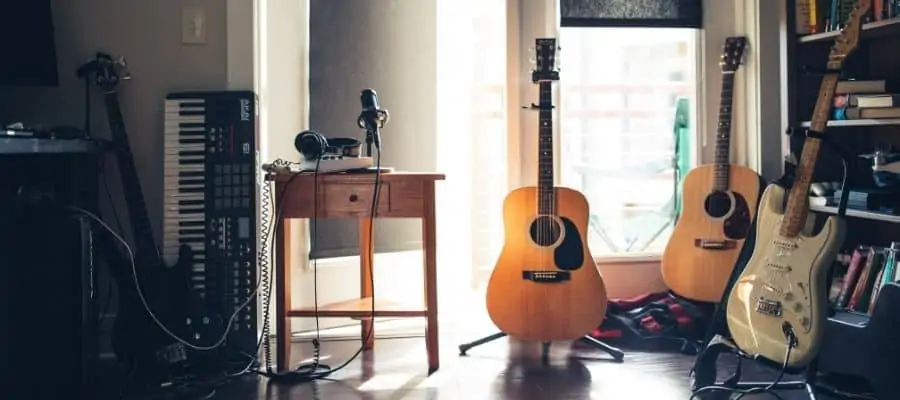
The process of learning how to play an electric and acoustic guitar has more similarities than differences. They need both hands and mind to learn something new. Being consistent in practicing, having effective practice sessions, and having a goal are common practice postulates.
You should be able to learn in the exact same amount of time. There are some physical differences between them, but that won’t affect the practice time.
Conclusion
Playing is enjoying your hard work while practicing. So, practice makes perfect playing. In order to improve yourself, practice is the key.
Guitarists should practice every day in short sessions because we can’t focus for a long period of time. If needed, one day should be determined for a break because your brain may need time to process all those new things.
It depends on you and your goals how many hours a day you should practice. If playing guitar is just your hobby, you need less time than those who want to become masters.
But sometimes, even 4 hours of practicing can be insufficient. That’s because guitarists don’t do high-quality practice sessions.
So, for better results, make a good atmosphere, use the metronome, tune your guitar, write down every success and every mistake, and don’t multitask.
One hour of practice a day is enough for you to improve yourself in playing, except if you’re a professional musician. But, don’t expect you to become a master in 3 months. Be realistic and have realistic goals.
In three months, you can become such a good player if you practice consistently. Being a master requires long-term practice. And after practice, there comes practice again.
The best way to practice is to follow a proper practice routine. First of all, do everything that will make your practice effective. Work on technique development, and train your ears. Learn new songs, new chords, and improve the transition between them.
Learn music theory, even if you find it boring. That will ease your improvement path.
After doing these steps, improvise. Use scales and your creativity.
The guitar is such an interesting instrument. You can play it your whole life and again have to learn something new, and at the same time practice for a month or two and have so much fun!
If you found this article useful, you may want to save this pin below to your Guitar board.

2 thoughts on “How Much Should I Practice Guitar – Effective Practice Makes A Difference”
Leave a Reply
Recent Posts
When learning new songs have you noticed that some of the chord sequences sound really good? But when you tried to come up with your own chord sequence, or as we call it chord progression, you found...
Some guitarists insist on buying an expensive amplifier with their electric guitar. They assume that this is a must for every type of guitarist out there. However, in some situations, this isn’t...

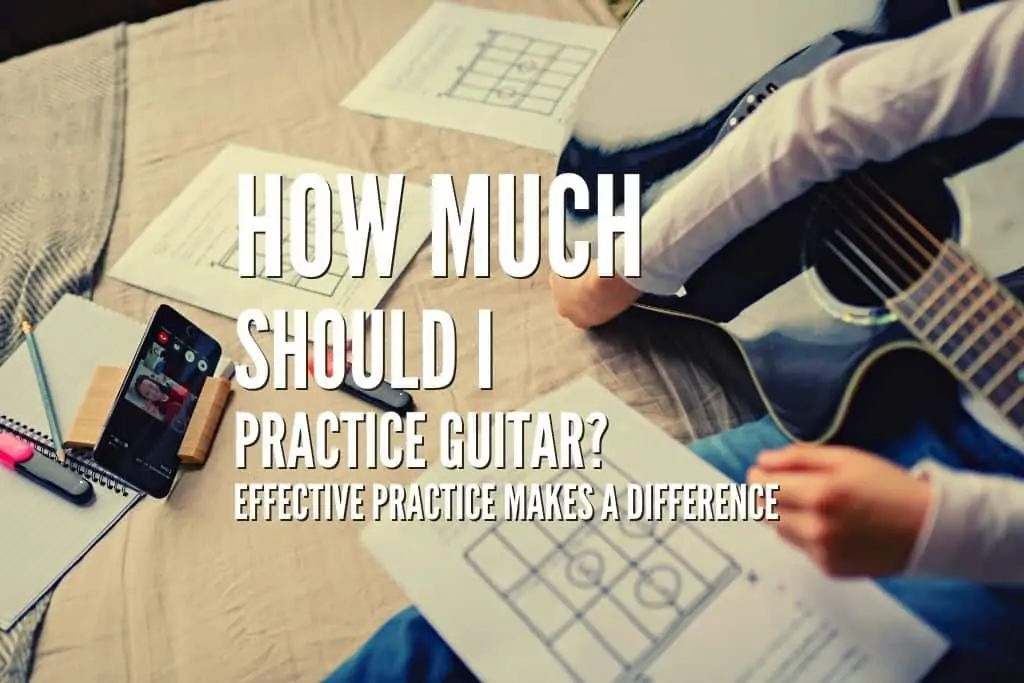
man I appreciate your honesty… wasn’t brutal but encouraging in a real way. I may add this applies to sso many other areas of life and I love the conclusion, that now the joy comes from showing others the way. Ultimately that is what God wants.
thanks
ron
Thanks Ron!